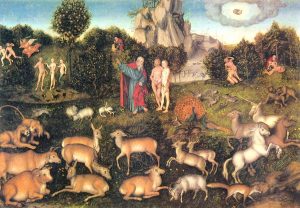Thoughts on Sunday’s Lessons for June 7, 2020
First Reading: Genesis 1:1-2:4a
As our readings move from Eastertide to Pentecost, we have celebrated Christ’s ascension into heaven to sit at the right hand of the Father, then seen the Holy Spirit coming in wind and fire.

The Garden of Eden (1530), oil painting on poplar wood by Lucas Cranach the Elder (1472-1553). Gemäldegalerie Alte Meister, Dresden, Germany. (Click image to enlarge.)
Now as Trinity Sunday marks the start of the six-month-long season after Pentecost, we reflect on Creator, Son and Holy Spirit in their mysterious dance, three persons in one triune God, the Holy Trinity. Sunday’s readings begin where Scripture begins as our first reading presents the first of the two creation stories that open the book of Genesis. We need not take the Genesis story literally to appreciate its beautiful poetry as it portrays a monotheistic God – Creator, Word and Spirit wind moving over the waters – as a loving creative force at work in the world.
Psalm: Psalm 8
This Psalm of praise beautifully knits together the ideas that call for our attention on Trinity Sunday. In it we give praise and thanksgiving for God’s earthly creation. We remember that we hold dominion over creation. We accept that this duty demands that we preserve and protect “the beasts of the field, the birds of the air, and the fish of the sea.” And finally we worship the majesty of God, our Creator who made it all.
Alternate Psalm: Canticle 13
As an optional alternative to Psalm 8 on Trinity Sunday we may sing Canticle 13 from the Book of Common Prayer, a portion from the Song of Praise from the Apocryphal Prayer to Azariah. Also known as the Song of the Three Young Men who danced and sang in defiance of the flames in King Nebuchadnezzar’s fiery furnace, these verses, added as a supplement to the song in modern times, offer resounding praise and exaltation to God as Creator, Son and Holy Spirit.
Second Reading: 2 Corinthians 13:11-13
You won’t find many explicit references to the Holy Trinity in the New Testament, as it took the early church nearly 300 years to fully work out the Trinitarian theology expressed in the Nicene Creed. But we hear foreshadowings of this idea in this reading and the Gospel. In Paul’s loving farewell at the end of his second letter to the people of Corinth, he urges this often squabbling congregation to sort out their conflicts and love one another as God loves them, asking this in the “grace of the Lord Jesus Christ, the love of God, and the communion of the Holy Spirit.”
Gospel: Matthew 28:16-20
Last week, Pentecost Sunday, we heard of the Holy Spirit coming to the disciples in wind and fire, inspiring them to go out to the world and tell the good news of the resurrection and eternal life. Now on Trinity Sunday we hear the final verses of Matthew’s gospel – his only account of the risen Christ. Jesus, in Matthew’s account, had told the women at the tomb to tell the eleven disciples to go on to Galilee, where he would meet them. Now they meet on a mountain. Some of them worship him, but others are doubtful. Then Jesus commands them to go and “make disciples of all nations, baptizing them in the name of the Father, Son and Holy Spirit,” a great commission to Christian evangelism.
